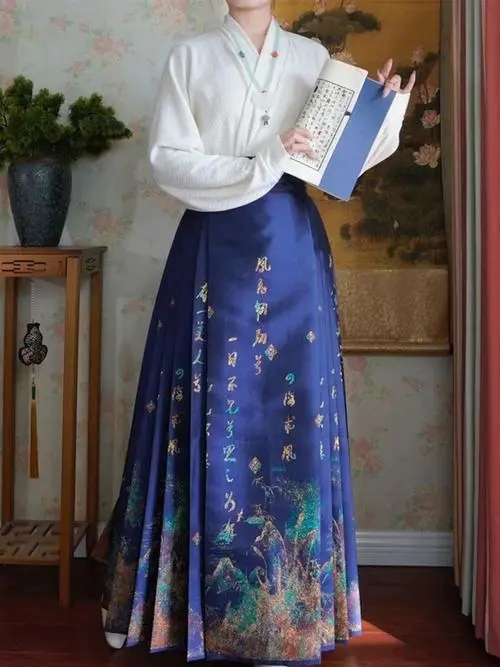There are various explanations for the origin of the horse faced skirt, and the following three explanations are listed:
The history of horse faced skirts can be traced back to the Song Dynasty. The spinning skirt of the Song Dynasty was a functional “crotch opening skirt” designed by women for the convenience of riding donkeys, which already had the horse face shape of a horse face skirt. The term “Ma Mian” was originally a building name, referring to a platform that protrudes from the outside of the city wall at a certain distance to prevent dead corners from appearing under the wall. The smooth skirt door of the horse faced skirt is similar to this type of city wall, hence its name. The connection between the city wall’s horse face and the skirt first appeared in the “Ming Palace Chronicles”, and since then, the horse face skirt has been named and has been passed down to this day.

The horse face skirt originated from the worship and prayer of horses by ancient ethnic minorities. Horses have a special status in ethnic minority cultures and are considered sacred animals. Therefore, the image of horses is embroidered on skirts in order to receive the protection and protection of divine horses, hence the name Ma Mian skirt. two
The horse faced skirt was first created by the Khitan people. They improved the traditional Hanfu dress by changing the design of only one skirt door opening behind the skirt to four skirt doors, making it convenient for cycling and showcasing leg lines, making it both practical and personalized. This type of skirt gradually developed and became popular among Han Chinese women, eventually forming the style of a horse faced skirt.
In addition, the horse faced skirt was particularly popular during the Ming and Qing dynasties, becoming one of the classic clothing for women. However, it gradually weakened in the late Qing dynasty and early Republic of China, and was replaced by the westernized Manchu qipao. However, at the beginning of this century, with the improvement of national strength and the enhancement of national confidence, horse faced skirts, as a part of Chinese culture, gradually began to revive.
